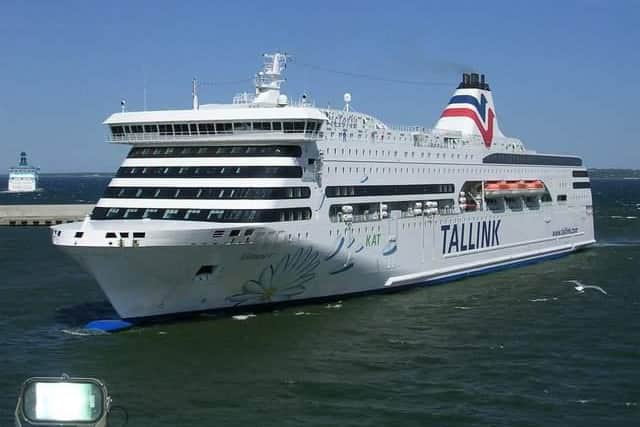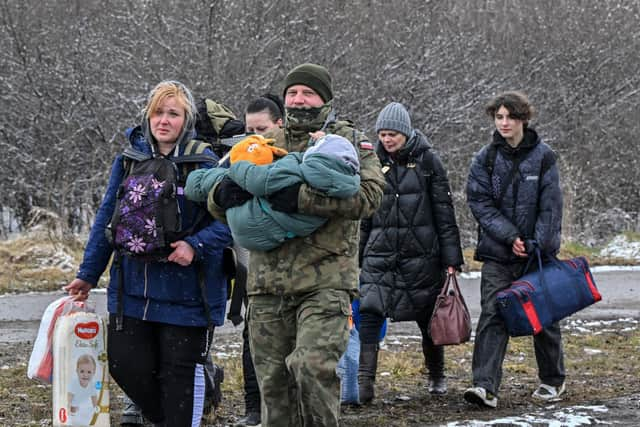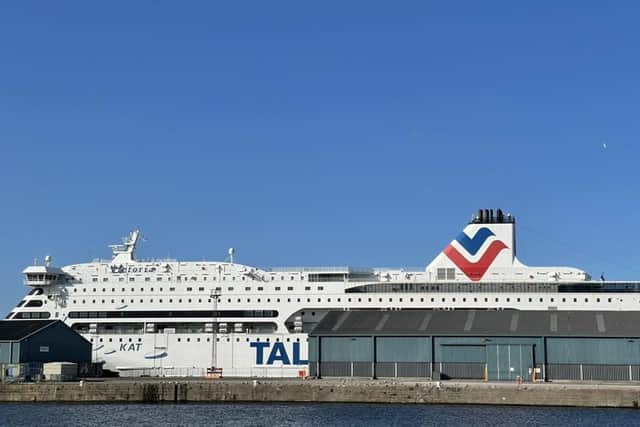War in Ukraine: Has governments using cruise ships for emergency refugee housing ever worked?
Tens of thousands of displaced people from countries such as Syria and Afghanistan had poured over the borders into Western Europe and countries were struggling to cope. In response, the Swedish government chartered a ship, the Ocean Gala, which had previously been used as a luxury cruise ship in the 1980s and 1990s.
They planned to dock it in Utansjö harbour outside of the city of Härnösand, where it would be a temporary home for people who had fled conflict and persecution at home.
Advertisement
Hide AdAdvertisement
Hide AdAt a cost to the Swedish authorities of £65,000 a day, the boat boasted a theatre and swimming pool, which refugees would be able to use. Willis Åberg, head of housing at the Swedish Migration Board, said at the time the organisation was “thinking outside the box”.


“Those who are going to stay in the boat will, of course, be a bit cramped in the cabins, so it is really important that we arrange for them to have large common areas outside,” he said. “Having a theatre sounds really nice.”
However, the plan was abandoned months later, without a single refugee setting foot on board.
The County Administrative Board decided there was not sufficient local infrastructure to accommodate the refugees – such as capacity in schools and rubbish disposal access – and refused to issue permits for the boat to dock.
A protracted legal wrangle ensued between the authorities and the company set up to run the ship, Floating Accommodations Sweden (FAS), with the Court of Appeal finally ruling five years later the Swedish Migration Authority had not breached its contract due to FAS failing to acquire necessary permits to operate.


A similar idea was considered – and later abandoned as too expensive – by the UK Government in 2020 to house refugees arriving illegally in the UK while their asylum claims were being processed.
Now hundreds of Ukrainian refugees are this week being welcomed aboard a cruise ship in Scotland, where concerns have already been raised around both living conditions for refugees and the strain on local infrastructure.
In Leith, where 1,600 refugees are due to take up residence on the MS Victoria, Edinburgh council leader Cammy Day has warned the Scottish Government needs to take action to find a solution for schooling for the hundreds of children likely to be among the new Leith residents.


Advertisement
Hide AdAdvertisement
Hide Ad“In terms of the support services for people who have come from a war zone, the requirement for jobs and schooling for young people needs urgent attention from a senior level in government because we don’t have a solution to that,” he said.
Refugee welfare groups such as the Scottish Refugee Council have also warned against the solution being used long term due to issues surrounding employment status and the ability to apply for jobs without a permanent address on land.
Scientists have raised fears over potential outbreaks onboard of illnesses such as Covid-19. Cruise ships – even when run as luxury holiday accommodation – are notorious for outbreaks of diseases such as norovirus.
Concerns over such schemes are being echoed in the Netherlands, where a proposal to dock a second cruise ship for 1,000 refugees on the IJ waterway at Zaanstad has just been scrapped amid local fears over nitrogen pollution from the ship.


“We have looked at all sorts of measures to limit the nitrogen emissions, but they will not allow us to keep to the nitrogen rules,” the Zaanstad council said in a statement on Monday.
Yet despite the local difficulties and opposition from refugee aid charities in the Netherlands, the Dutch government is still committed to the idea of refugees living at sea – but is looking for ways of mooring refugee ships offshore. The Dutch cabinet said last week that it would charter three more ships and is looking for locations out at sea where they can be safely located, without breaching human rights.
One scheme, however – hosting 1,200 refugees on a former cruise liner in Rotterdam – has been hailed as successful. Originally meant to run until June, the use of the Volendam ship has now been extended to September. Docked at Merwehaven, a cargo port on Rotterdam's River Maas, residents can disembark whenever they want to, including to attend school.
While the Dutch Refugee Council, VluchtelingenWerk Nederland, has branded the idea of housing refugees offshore “absurd”, Martin van der Linden, spokesman for the organisation, acknowledged cruise ships docked in a harbour that allow refugees to come and go as if they lived on land, are a necessary option for the Netherlands due to the scale of the crisis.
Advertisement
Hide AdAdvertisement
Hide Ad"In our experience it is better not to house refugees in large groups, but to spread them throughout society,” he said. “This is better for a fast integration into society. But currently there is a big shortage of houses and asylum centres in The Netherlands.
"Hundreds of refugees have even been sleeping outside in the last weeks. Thousands have been living in sport halls and tents with camping beds, no privacy and often a lack of basic needs. So in this context it makes sense to use cruise ships as a temporary measure.”
Refugee crises are not the only time that cruise ships have been used in an emergency.
In the aftermath of Hurricanes Irma and Maria, the US Government signed a $74.7 million (£62m) deal in 2017 to house federal aid workers on a cruise ship in the United States Virgin Islands. However, it was later found the ship hosted fewer than half the federal workers than had been planned, at a cost of $5,959 (£4,950) per person per week.
Comments
Want to join the conversation? Please or to comment on this article.
